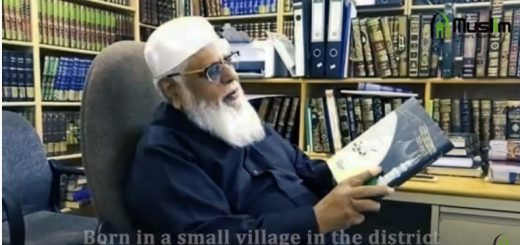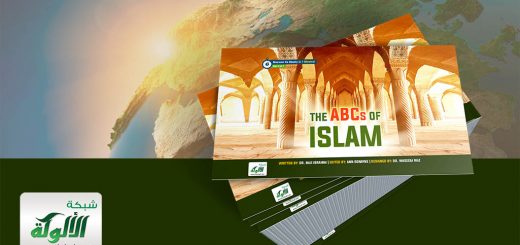If the believer is confident in his spiritual crusade, he will not practice his actions secretly, instead he will make them public; and he will not pay attention to the enemies of his call if he is sure that he can surmount them, as Umar (radiallahu ‘anhu) did in his emigration. Such attitude, that of being strong enough coupled with the potency of his conviction will frighten Allahs enemies and put fear in their hearts. There is no doubt that had he Makkahns united, they could have beaten Umar (radiallahu ‘anhu), but Umar’s bravery put fear in the soul of each and everyone of his enemies. Each was afraid that if he were to attempt in stopping Umar (radiallahu ‘anhu), his mother would then be bereaved of him, and the evildoers are misers in terms of giving up their lives as they greatly valued their existence in the world.
When the wrongdoers give up hope of resisting the call for truth and reform, and when the believers escape from their hands to become free from injustice, such people scout all means to kill the reformer. This is with the hope that by killing him, they would get rid of the person and and thus terminate his movement. This is the mentality of the evil enemies of reform in every epoch. We have seen and witnessed similar actions in our own lives.
The truthful soldier, who is sincere to the movement, is willing to sacrifice his life in order to protect his leader. In the safety of the leader is the safety of the movement itself. And in his death follows its defeat, destruction, weakness and disintegration. Ali’s (radiallahu ‘anhu) heroism on the night of the Prophet’s emigration, may Allah be pleased with him, sleeping in the Prophet’s bed and sacrificing his own life for that of the Messenger’s (peace be upon him), is a spark of the bravery within him. It was not a remote possibility for the swords of the young men of the Quraysh to fall upon his head in lieu of his gesture of covering-up for the Messenger’s (peace be upon him) escape. Ali (radiallahu ‘anhu) did not mind that for it was enough for him that Allah’s Messenger, the Prophet of the nation (peace be upon him) and leader of the movement, escapes unscathed for the benefit of Islam and to the dismay of its enemies.
The fact that the polytheists trusted Allah’s Messenger (peace be upon him) with their possessions, even though they were fighting against him and insisting upon his death, is an evidence that the enemies of the mission, deep in their hearts, believed in the righteousness, honesty, and nobility of the reformer. They believed that he was better off than them in his behavior and that his heart was purer than theirs. But the insensitivity or indifference of their hearts, their stubbornness, and their resolute grip towards their errant customs and beliefs aptly known as resistance to change lured them to fight against him, harm him and finally conspire to kill him.
The decision of a leader of a movement, president of a nation, or reformer to escape from certain assassination attempts is made in order to continue his movement to a broader power base in another place. And such must not be misconstrued as cowardice, running from death, or even unwillingness to sacrifice his body and life for the sake of the message.
The attitude of Abdullah Ibn Abu Bakr proves that the youth can influence the success of the movement. They are the backbone of every reform movement. Their dedication to sacrifice and their endurance helps the mission move swiftly towards victory. We can see that all of the early believers in Islam were young. Allah’s Messenger (peace be upon him) was forty years old when Allah sent him the message. Abu Bakr was three years younger than him and Umar was younger than both of them. Ali was the youngest of them all. Also younger than Allah’s Messenger were Uthman, Abdullah Ibn Masood, Abdul Rahman Ibn Auf, Al-Arqam Ibn Abi Al-Arqam, Saeed Ibn Zaid, Bilal Ibn Rabah, Ammar Ibn Yasar and others (may Allah be pleased with them all).
They were all young and they all carried the burden of the call upon their shoulders. For its sake, they sacrificed and endured torture, pain and death. Through them, Islam became victorious. And through their efforts and the efforts of their Muslim brethren, the state of the rightly guided Caliphs was established. They achieved the magnificent Islamic conquests that facilitated the proliferation of Islam today. And by Islam, Allah has delivered us from the ignorance of being misguided, idolaters, unbelievers and desolate.
The attitude of Aishah and Asmaa (may Allah be pleased with them) during the Messengers emigration is a proof of the need of the movement for women. They are more sensitive, more zealous, more forgiving and their hearts are purer and softer. A woman, once she believes in something, dismisses any difficulties she may face in spreading her beliefs or inviting people to them. She will do her best to convince her husband, her brothers and her children to accept her beliefs. The jihad of women for the sake of Islam during the Messengers life is a testimony of excellence. This assures us that the movement of Islamic reformation will remain slow and its effect upon society will be little or insignificant until the women participate in it. Their commitment will result in the raising of a generation of young women with faith, manners, nobility and purity because they are more capable of spreading proper behavior, which our society is in need of, in the community compared to men. Along with this, they’re going to be wives and mothers. They did a great service by molding the young companions and their successors. Together they raised that generation with good manners and behavior, and the love of Islam and its Messenger (peace be upon him). Such generation raised by those women during the Prophet’s time came to be known as the most honorable generation in history as a result of their pious intentions, upright behavior, piety in their religion and modesty and moderation in worldly affairs.
Therefore, today, we must realize and reflect upon this fact. We must do our best to make our young women and wives carry the flag of the Islamic movement among the community of women. They account for more than half of the nations population. We must encourage them to learn Islamic law in reliable institutions reputed for their sound Islamic teachings.
When a considerable number of these young women become knowledgeable in religion, experts in Islamic law, acquainted with Islam’s history, affectionate to Allah’s Messenger (peace be upon him) and are living according to the norms and mores of the mothers of the believers (the Messenger’s wives), then we will be able to maintain if not improve the wheels of Islamic reformation. Also, we will be able to draw closer to the day when our Islamic society will be obedient to the rules and legislation of Islam, Allah willing.
The inability of the polytheists to see Allah’s Messenger (peace be upon him) and his companion (radiallahu ‘anhu) while they were in the Cave of Thaur, even though they were held next to its mouth, and what the narrations say about the spider’s web and the birds having laid eggs near the mouth of the cave are examples of Allah’s divine care towards His Messengers, His workers and beloved ones. Due to Allah’s mercy for His slave, He did not allow the polytheists to put an end to the Prophet’s life or his mission, as Allah sent him to be a mercy for all of mankind. Similarly, Allah is preparing His sincere slaves to become accustomed to the fact that Allah is going to be grateful to them and He will not abandon them much more fail them in times of hardship or when they are weary and feeling down and out. He will always save them in critical situations. Most of the time, He will deceive the vision of those who are waiting for them in order to keep them from being inflicted with evil and treachery. This is evident in Allah’s rescue of the Messenger (peace be upon him) and his companion (radiallahu ‘anhu) when the polytheists had surrounded them in the cave, a concretization and realization of Allah’s words;
“Verily We support our Messengers and those who believe, in the world and on the Day of Witness:
[Qur’aan 40:51]
Lo! Allah defends those who believe
[Qur’aan 22:38]
Abu Bakr (radiallahu ‘anhu) feared that he and the Prophet (peace be upon him) would be discovered in the cave. This is an example of how a sincere soldier of truth should behave with respect to his honest leader upon perception of danger. The soldier should feel both frightened and worried. Abu Bakr (radiallahu ‘anhu) was not afraid for his own life. If he was, then in the first place he would not have accompanied Allah’s Messenger (peace be upon him) in this dangerous emigration knowing that the least punishment he could merit once caught would be death. Abu Bakr (radiallahu ‘anhu) feared for the noble Messenger’s life and for the future of Islam should the Messenger (peace be upon him) fall into the hands of the polytheists.
The Messenger (peace be upon him) eased Abu Bakr’s (radiallahu ‘anhu) worries by saying, “O Abu Bakr, what is your thinking of two with whom Allah is their third?” This is an example of complete trust in Allah, confidence in His support, and depending upon Him in times of hardship. It is a clear proof of the truthfulness of the Messenger (peace be upon him) in his claim to be a Prophet. In the most critical situation he showed his confidence that Allah, the One who sent him with guidance and as a mercy to the people, would not fail him at such a time. Can anyone outside of a genuine prophet display such magnitude of confidence in Allah? In such a situation, the great divide, the difference between a real reformer to that of a pretender prevailed and showed. The hearts of the sincere believers are always filled with their happiness in Allah as well as their confidence in his victory. The others, those who pretend, fall apart in times of fear, uncertainty, danger and difficulty, and are left without a friend or supporter in Allah.
An incident involving Suraqah and the Messenger (peace be upon him), when Suraqah caught up with the Prophet (peace be upon him) and was powerless to reach him, confirmed if not provided proof of the prophet hood of Muhammad (peace be upon him). At such a time, the legs of Suraqah’s mare were sinking into the sand while he headed towards the Prophet (peace be upon him), but when Suraqah dismounted and directed the mare towards Makkah, she stood up from her place. When once again he tried to prod her towards the Messenger (peace be upon him), the horse’s powerlessness resumed and it stumbled. Could this be possible to anyone other than the messenger who is subject to Allah’s help? Certainly, not. Suraqah understood this and called upon the Messenger to grant him safety. He acknowledged that the Prophet was divinely protected and that no man would be able to surmount the protection of Allah. Thus, Suraqah was pleased with the loss of the bounty and the declaration of the messenger’s promise to him of the bracelets of Chosroes, the King of Persia.
The Messenger’s (peace be upon him) promise to Suraqah of the bracelets of Chosroes constitutes another miracle because a man who seems to be fleeing from his people rarely conceives that he will conquer a land like Persia and take the treasures of Chosroes, unless, of course, if one is a messenger. The Messenger’s (peace be upon him) promise to Suraqah was fulfilled. Suraqah asked Umar Ibn Al-Khattab (radiallahu ‘anhu) to fulfill the messengers promise when he saw the bracelets of Chosroes in the booty. Umar (radiallahu ‘anhu) personally placed the bracelets on Suraqah while all of the companions watched. He thanked Allah, the One Who stripped Chosroes of his bracelets, and made Suraqah Ibn Jasham (radiallahu ‘anhu), the bedouin, wear them. One after another, miracles took place during the emigration in order to strengthen the believersfaith after seeing and experiencing them. Such miracles also ascertained to those who received the earlier revelations, who have denied or hesitated to believe in the Prophet (peace be upon him), certain that he was the Messenger of the Lord of the Worlds.














